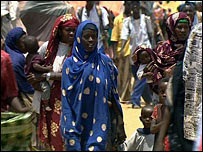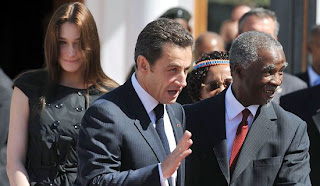 MOGADISHU, March 16 (Reuters) - A senior Somali Islamist leader rejected on Sunday an offer of talks by the interim government to end insurgent attacks, including beheadings, that have sparked one of the world's worst humanitarian crises.
MOGADISHU, March 16 (Reuters) - A senior Somali Islamist leader rejected on Sunday an offer of talks by the interim government to end insurgent attacks, including beheadings, that have sparked one of the world's worst humanitarian crises. Somali Prime Minister Nur Hassan Hussein said last Wednesday his government was ready to negotiate with opposition groups to end a 15-month insurgency against government troops and their Ethiopian military allies.
Calling for international mediation led by the United Nations' special envoy to Somalia, Hussein said the government was willing to hold talks in any location to end fighting that local aid groups said had killed 6,500 people last year.
Islamist leader Sheikh Hassan Dahir Aweys dismissed the offer, saying his sharia courts movement and its fighters did not recognise the government of the war-ruined country.
"This is not a government. We believe they are people who brought the enemy forces to our country. They are criminals," Aweys, a hardline Muslim cleric, told Reuters in an interview.
"Our fight is against Ethiopia and as long as they are there Somalis cannot have dialogue," he said by phone from Eritrea, where he is living in exile after fleeing Somalia last year.
Aweys, who the United States says is linked to al Qaeda, said the Islamists were "freedom fighters".
"The country is under Ethiopian colonisation and must be liberated from the enemy," said the former army colonel who was decorated for bravery in a war against rival Ethiopia in 1977.
Many Somalis living in the shell-shattered capital fear the Islamists' refusal to accept talks unless historic foe Ethiopia withdraws its troops signals more attacks which are already forcing some 20,000 civilians to flee Mogadishu every month.
Islamist insurgents were accused of spreading terror by cutting the heads off three Somali soldiers last week.
The head of the U.N. refugee agency told Reuters last Thursday that Somalia's problem was "intractable" with no sign of improvement. Guillermo Bettocchi said Somalia was a "negelected crisis" which surpassed Sudan's Darfur region.
Sheikh Aweys led Somalia's Islamic Courts Council, which ruled Mogadishu and much of southern Somalia in the second half of 2006, before it was ousted by allied Somali-Ethiopian forces.
Aweys recognised Prime Minister Hussein as "humble and a peace lover".
"But we are very sorry that he has placed himself in this position," he added.
The Horn of Africa country has had no effective government since warlords overthrew dictator Mohammed Siad Barre in 1991 and then turned on each other, plunging the country into chaos.
The remnants of Aweys' movement is now blamed for an Iraq-style insurgency punctuated with roadside bombings, assassinations and grenade attacks.
(Editing by Katie Nguyen)
(For full Reuters Africa coverage and to have your say on the top issues, visit: http://africa.reuters.com/ )



















